Health
Inside Uganda’s National Health Adaptation Plan to Combat Climate Change
Published
10 months agoon
By
Mak Editor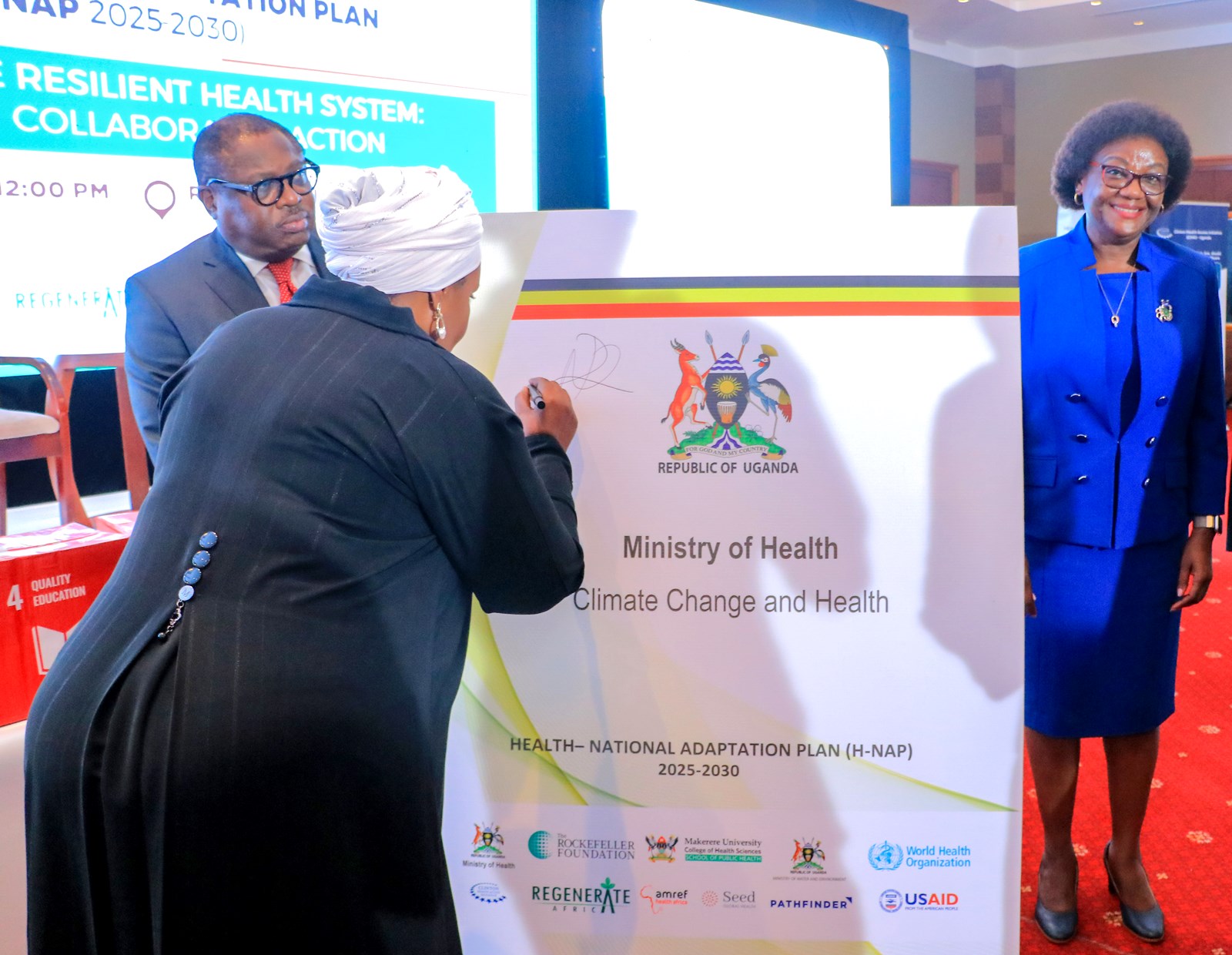
By John Okeya
On August 22, 2024, Uganda made history as the first African nation to launch a National Health Adaptation Plan (H-NAP), fulfilling the country’s global commitments at the UN Conference of Parties (COP) 26 and 28 summits in Glasgow (2021), and Dubai (2023), respectively, in response to the growing global climate change risks and challenges.
The National Health Adaptation Plan 2025-2030, dubbed H-NAP, which was launched by the health ministry yesterday in Kampala, seeks to fortify the country’s healthcare system against the current mounting health challenges driven by climate fluctuations, to safeguard public well-being amid the rising temperatures, erratic weather patterns, and associated health risks.
Officiating the H-NAP launch, Uganda’s Prime Minister, Rt. Hon. Robinah Nabbanja, represented by the third Deputy Prime Minister and Minister without Portfolio, Rt. Hon. Lukia Isanga Nakadama, commended the fruitful collaborative initiative of the government, development, and civil society partners in delivering the Health National Adaptation Plan.
“The government of Uganda has created an enabling policy and legal environment to tackle the climate change challenges,” she noted emphatically, revealing that: “In the Parish Development Model (PDM), we need to integrate climate change interventions. I was recently talking to my people (constituents in Mayuge district) about the PDM programme, I told them; ‘we gave you money and we know you are doing well. They said no, all our crops were washed away by the heavy rains, we did not get anything.’ So, it’s not all that easy.”
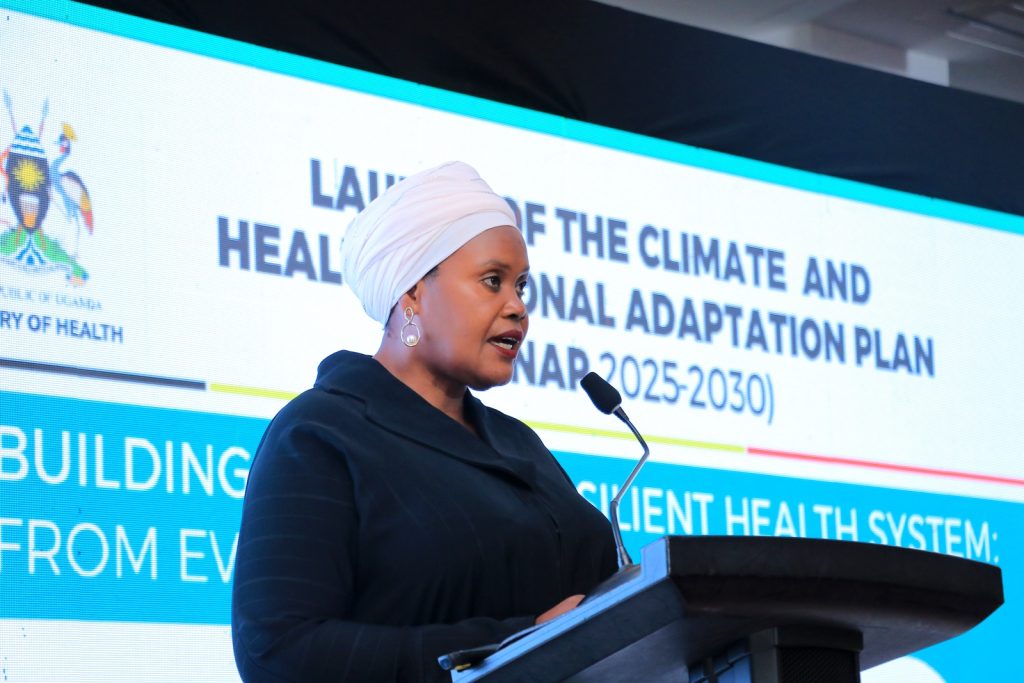
She said the current five-year term National Development Plan (NDP) III which is bound to expire and the new NDP IV underscore climate change as a cross-cutting issue requiring mainstreaming across all sectors, assuring that the Office of the Prime Minister (OPM) will coordinate multisectoral engagements for Ministries, Departments, and Agencies (MDAs) and support awareness raising for the new Health National Adaptation Plan.
“I congratulate the Ministry of Health and all sectoral partners for developing the Health National Adaptation Plan that we are launching today. This Plan is based on evidence from the Climate Change Health Vulnerability and Adaptation Assessment and should provide a systematic guide to building a resilient health system for Uganda,” the Prime Minister observed, urging the different multi-stakeholders to support the implementation of the Plan to harness its full potential in guiding the country’s climate change adaptation action.
Climate change adaptation, commonly used, means the steps taken to help both natural and human environmental systems adjust to the impacts of climate change, whether those changes are happening now or expected in the future. Such interventions may include actions, policies, and strategies designed to specifically reduce the negative effects of climate change while making the most of any potential benefits that may arise.
On the other hand, climate change refers to the long-term shifts in temperatures and weather patterns, mostly caused by human activities like burning fossil fuels, which release greenhouse gases (also known as GHGs) into the atmosphere. These changes lead to more extreme weather events, rising sea levels, and ecosystem disruptions, impacting everything, from agriculture to human health.
One of the key successes arising out of the two weeks deliberation between 120 world leaders and over 40,000 registered participants, including 22,274 party delegates, 14,124 observers, and 3,886 media representatives at COP26 summit in Glasgow, from Sun, Oct 31, 2021 – Fri, Nov 12, 2021, was the compromise to step up support for climate change adaptation, reflected in the Glasgow Pact calling for the doubling of finance to support developing countries like Uganda in adapting to the adverse weather impacts and build resilient health systems.
A key highlight during the Glasgow negotiations, was the realisation by the global actors of the critical linkage between climate change and health, as the discussions culminated in the consensus that the worsening climate crisis directly threatens global health through increased extreme weather events, the spread of diseases, and the increased strain on healthcare systems, thus necessitating urgent integrated action to protect public health.
Subsequently, nation states committed to developing national climate change health vulnerability and adaptation assessments and the health national adaptation plans, both documents that Uganda has now concluded, to emerge as a regional and global leader in the charge towards adaptation to combat climate change effects and build resilience.
The November 2023 Climate Change Health Vulnerability and Adaptation Assessment (VAA) for Sound Management of Climate Change-related Health Risks in Uganda and the Health – National Adaptation Plan (H-NAP) 2025- 2030, were conducted through a collaboration led by Uganda’s Ministry of Health, with partners including Rockefeller Foundation, Makerere University, World Health Organization, Ministry of Water and Environment, Amref Health Africa, Reproductive Health Uganda, Pathfinder Uganda, Tree Adoption Uganda, Seed Global Health Uganda, Clinton Health Access Initiative and Regenerate Africa.
Makerere University School of Public Health’s Dr. John Bosco Isunju, who led the teams in the development of both the VAA and H-NAP, was honoured by the Ministry of Health with the 2024 Climate and Health Champions Award during the Health National Adaptation Plan Launch, for his significant contributions to building a climate-resilient health system in Uganda.
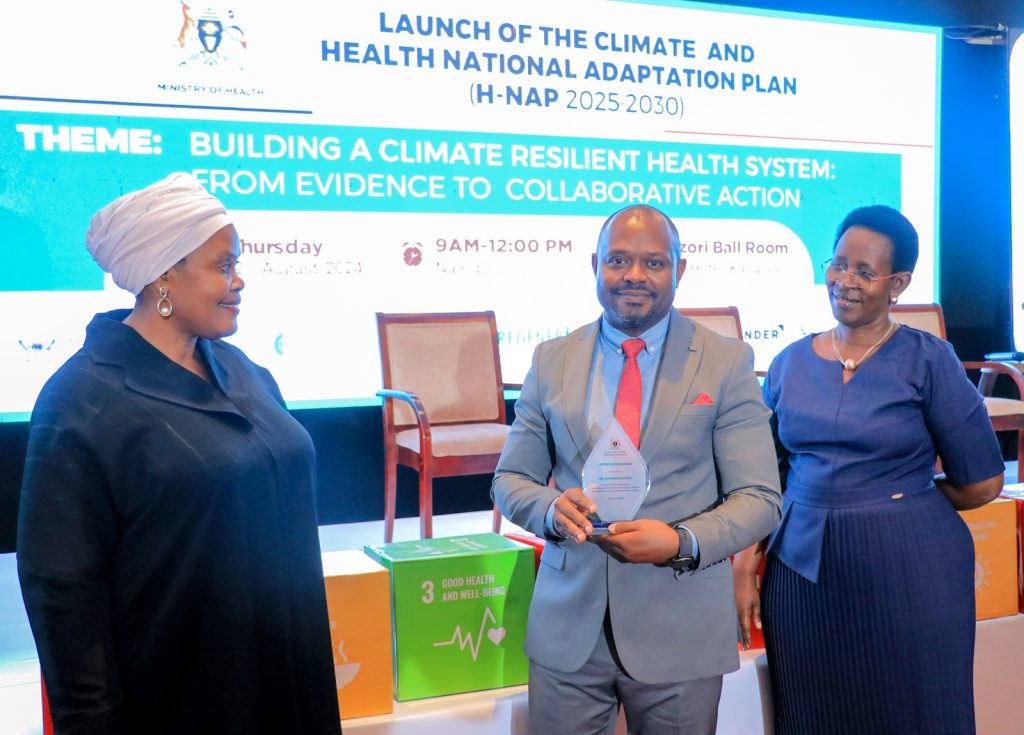
The Rockefeller Foundation’s investment played a pivotal role in funding the development of these two strategic documents. Mr. William Asiko, Vice President and head of The Rockefeller Foundation’s Africa Regional Office, emphasised, “Climate change is now the gravest threat to the health and well-being of billions of African people. Initiatives like Uganda’s Health National Adaptation Plan demonstrate how African countries are rising to the challenge by scaling the necessary climate solutions and setting an example for the world.”
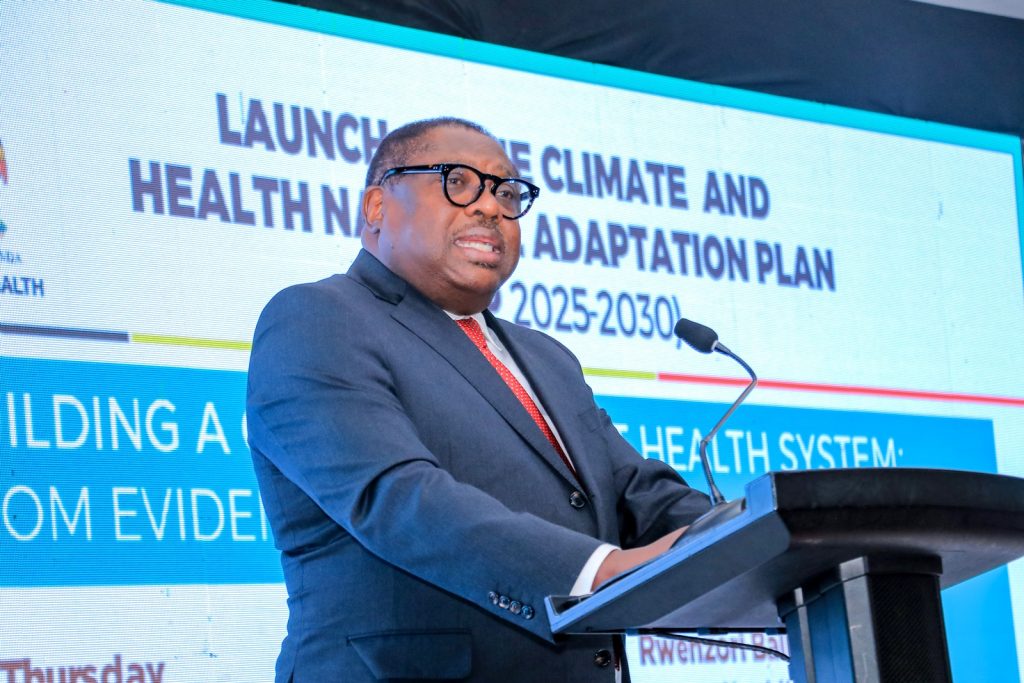
Makerere University Vice Chancellor, Prof. Barnabas Nawangwe, in his remarks delivered by the University Secretary, Mr. Yusuf Kiranda commended the role played by the partners in the development of the Plan, noting that: “Our academics from the Makerere University School of Public Health played a vital role in leading the Climate Change Vulnerability and Adaptation Assessment (VAA), which has been instrumental in shaping the development of the H-NAP.”
“This is just one example of Makerere University’s strategic commitment to research, innovation, and capacity-building. We are dedicated to generating evidence and human resources capabilities that guide decision-making and contribute to the development and implementation of climate-resilient strategies in health, agriculture, and other sectors,” the Makerere University Vice Chancellor observed.
He stated that the success of the National Adaptation Plan depends on the strength of our collaborations, which requires concerted efforts of government ministries, health agencies, civil society organisations, the private sector, development partners, and the academic community, as he reiterated University’s commitment to being a key partner in the endeavour.
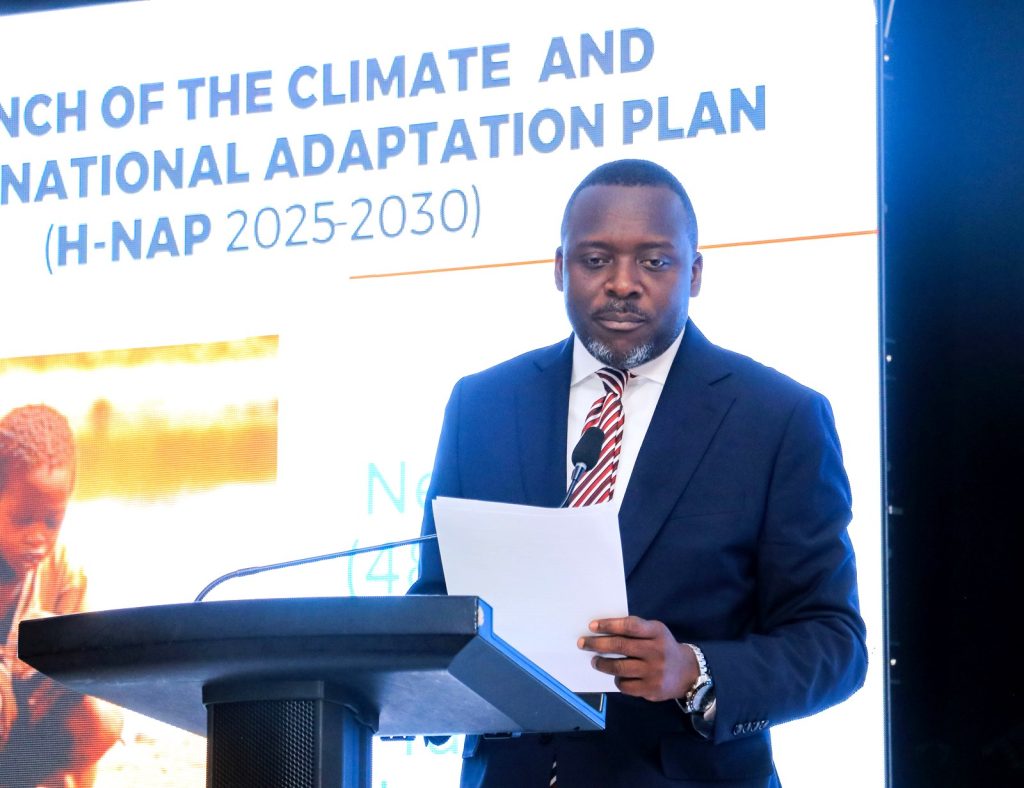
Today, Uganda, like the rest of the region and the globe, continues to grapple with the adverse effects of climate change. Subsequently, the Health National Adaptation Plan’s overarching goal is to enhance the resilience of Uganda’s health sector against climate-related impacts by incorporating climate adaptation into health strategies and planning, ensuring sustainable and continuous healthcare services during climatic challenges;
“Uganda is already experiencing severe climate change effects, such as floods, droughts, and temperature changes, which contribute to health issues like waterborne diseases, vector-borne diseases, malnutrition, and mental health problems.” The H-NAP report reads in part.
Its precursor, the 2023 Climate Change Health Vulnerability and Adaptation Assessment (VAA) survey, conducted across 716 selected health facilities in Uganda, highlighted the significant risks and challenges that climate change poses to public health.
The Vulnerability Assessment revealed that many healthcare facilities in Uganda are highly vulnerable to climate change-related hazards, due to unpreparedness across several critical components. In terms of energy, healthcare facilities were found to lack secure locations to protect emergency energy sources from hazards, had inadequate coverage for critical service areas, and failed to consistently check alternative energy sources.
The health workforce was also underprepared, with gaps in participation in climate adaptation plans, insufficient readiness for outdoor work during extreme conditions, and limited capacity to identify and manage health conditions, worsened by climate impacts.
Significant weaknesses were apparent in water, sanitation and hygiene, and healthcare waste management, including inadequate strategies to monitor and reduce water contamination, limited preparedness to prevent vector breeding in facility water systems, and a lack of comprehensive water safety and contingency plans. Post-hazard recovery plans were insufficient, with no safe locations for critical equipment during emergencies, inadequate safety measures for vital supplies, and inconsistent evacuation mechanisms for health workers and patients.
“These findings highlight a need for implementation of climate change adaptation plans and policies, building capacity of the health workers, and strengthening WASH management systems and water safety plans. There’s also a need for improvement of the reliability of energy infrastructure, development of contingency plans and enhancement of infrastructure resilience, evacuation plans, and post-disaster recovery,” the VAA report reads in part.
Today, Uganda has established a robust policy and legal framework to address climate change, including the National Climate Change Policy of 2015, the Climate Change Act of 2021, and the updated Nationally Determined Contribution of 2022. These frameworks aim to transform Uganda into a climate-resilient, low-carbon society by 2050.
The Uganda National Health Adaptation Plan (H-NAP) aligns with these policies, emphasising the integration of climate change adaptation into health sector plans and policies.
“A key recommendation to tackle climate change issues in Uganda is the integration of climate services for health. These services involve the provision of climate data, tools, and information tailored to the health sector’s needs, enabling health professionals to better anticipate, prepare for, and respond to climate-related health risks. Climate services for health include forecasting climate variables, monitoring and predicting the spread of climate-sensitive diseases and issuing early warnings for heatwaves and air pollution episodes,” The H-NAP reads in part.
According to the Plan, by integrating these services into health planning and operations, Uganda can enhance its public health resilience against the impacts of climate change. Furthermore, the H-NAP proposes a range of short-term and long-term interventions across ten components that include climate-transformative leadership, climate-smart health workforce, integrated risk monitoring, and sustainable financing.
From the H-NAP, specific actions identified include developing guidelines for mainstreaming climate and health, training health workers, enhancing disease surveillance systems, and revising infrastructure standards for climate-proofing. Also, the plan presents a financing framework to mobilise resources for implementing the identified interventions. This includes developing a comprehensive resource mobilisation plan, increasing national budgets for health and climate change policies, and advocating for health issues in climate funding streams.
Uganda is all too familiar with the harsh realities of climate change, having continuously experienced rising temperatures, prolonged droughts, and increasingly severe rainy seasons—each intensifying public health challenges. This National Health Adaptation Plan marks a critical step in the country’s climate action efforts, standing as the first of its kind. It serves as a crucial component of Uganda’s broader strategy to mitigate climate impacts and safeguard public health in the face of growing environmental threats.
You may like
-
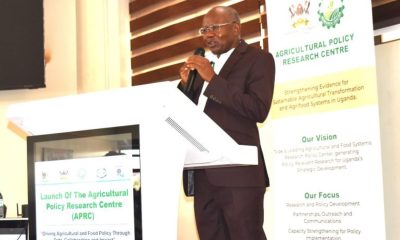

APRC Trains Graduate Students & Stakeholders in the Use of the African Agriculture Adaptation Atlas
-
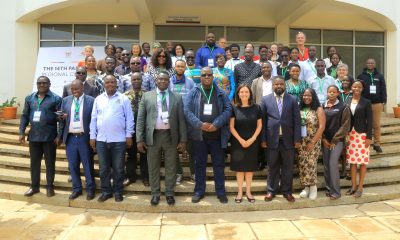

Harmonizing Africa’s Future through Musical Arts Education
-


Swedish Ambassador Calls on Uganda to Lead Africa’s E-Mobility Revolution
-


Call for Abstracts: Digital Health Africa 2025
-
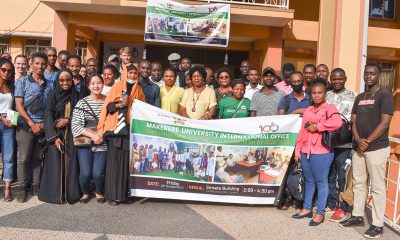

Undergraduate Admission Lists for International Applicants 2025/2026
-


Admission Lists -Disability and District Quota Schemes 2025/26
Health
Call for Abstracts: Digital Health Africa 2025
Published
2 days agoon
July 2, 2025By
Mak Editor
The Digital Health Africa 2025 Conference will provide practical insights in the potential applications of digital technologies, using maternal and child health, as important examples. Topics of interest will include patient registries, safety signals, vaccine use in pregnancy/breastfeeding, labelling of vaccines in pregnancy, emerging infections and antibiotic resistance, telemedicine, pharmacometric modelling, precision medicine, medicines regulation, ethical and legal aspects, and capability enhancement.
Applying an integrated multi-site face-to-face and remote format, this hybrid Conference will use digital tools to allow delegates and speakers from three different regions, South Africa, Uganda and Germany, as well as fully virtual participants to engage with one another. This will offer a nexus for collaboration and networking to promote partnerships among local and international stakeholders as well as capacity building for young scientists. Delegates will have the opportunity to engage with experts from industry, academia, healthcare providers, government and regulatory agencies as well as patient representatives to learn from one another and to gain valuable insights into the latest trends and best practices in digital health.
Abstracts should fit into one of these categories:
- Maternal and Child Health (MCH) & Digital Innovation
- Infectious Diseases & Antimicrobial Resistance (AMR)
- Digital Health Systems & Scaling
- Governance, Data Management & Interoperability
- Artificial Intelligence in Health & Research
- Pharmacometrics & Digital Tools
- Case Studies & Lessons Learned
- Cross-cutting & Strategic Perspectives
Submission deadline: 31st July 2025.
Accepted abstracts will be presented as interactive posters:
- a physical poster presentation at one of the conference sites
- an e-poster (digital version of your physical poster for sharing online)
- a 3-minute recorded presentation to accompany the poster.
Presenters with accepted posters will be offered complementary conference registration.
Submit your poster abstract here: https://forms.gle/aXYHeZSwX2EhEUas5
Health
Emorimor Calls for Makerere to Upgrade Parenting Course
Published
3 days agoon
June 30, 2025By
Zaam Ssali
The Iteso Cultural Leader, His Highness Emorimor Papa Paul Sande Emolot, has called on Makerere University to elevate the Science of Designing, Adaptation, and Implementation of Evidence-Based Parenting Interventions course into a fully-fledged programme. This, he argued, would strengthen the capacity of practitioners implementing parenting interventions across Uganda.
Speaking at a graduation ceremony held on 11th June 2025 at Makerere University where 35 practitioners completed the 12-week course, Emorimor Papa Emolot emphasized the transformative power of effective parenting. He urged aspiring parents and advocates of the Parenting for Respectability model to enroll in the course.

Citing the impact in his own sub-county and village, the cultural leader revealed that over 800 families had already benefited from the programme.
“We now see peace and love in homes where there was once conflict. Without good parenting, you risk raising animals instead of children,” he passionately stated.
He praised the course for equipping practitioners, policymakers, and researchers with the skills needed to design culturally sensitive, evidence-based parenting interventions tailored to Uganda’s context. Among the notable graduates was Her Royal Majesty Juliet Among Emolot Atomeileng Akaliat Toto, who reaffirmed her commitment to advancing family-strengthening initiatives using the skills and knowledge acquired.

Dr. Godfrey Siu, Senior Lecturer and Course Leader at Makerere University, described the course as a timely intervention. During this remarks, Dr. Siu described the event as a significant milestone in advancing the field of evidence based parenting intervention and family strengthening in Uganda.
“This course is meant to empower you as practitioners, policy makers and all those involved in development and implementation of parenting work. It provides both theoretical knowledge and practical tools essential for developing high quality interventions”, Dr. Siu noted. He urged the pioneer group to carry forward the expertise as champions of designing, adaptation and implementation of evidence parenting interventions.

Representing the Permanent Secretary of the Ministry of Gender, Labour and Social Development, Dr. Aggrey David Kibenge, Juliana Naumo, Commissioner for Culture and Family Affairs, said the course supports the government’s agenda to address negative social outcomes affecting families.
“By grounding parenting in research, harmonizing policy with practice, and advocating for equity, we will ensure no family is left behind,” she said. “Cross-sectoral collaboration is key to unlocking transformative change.”
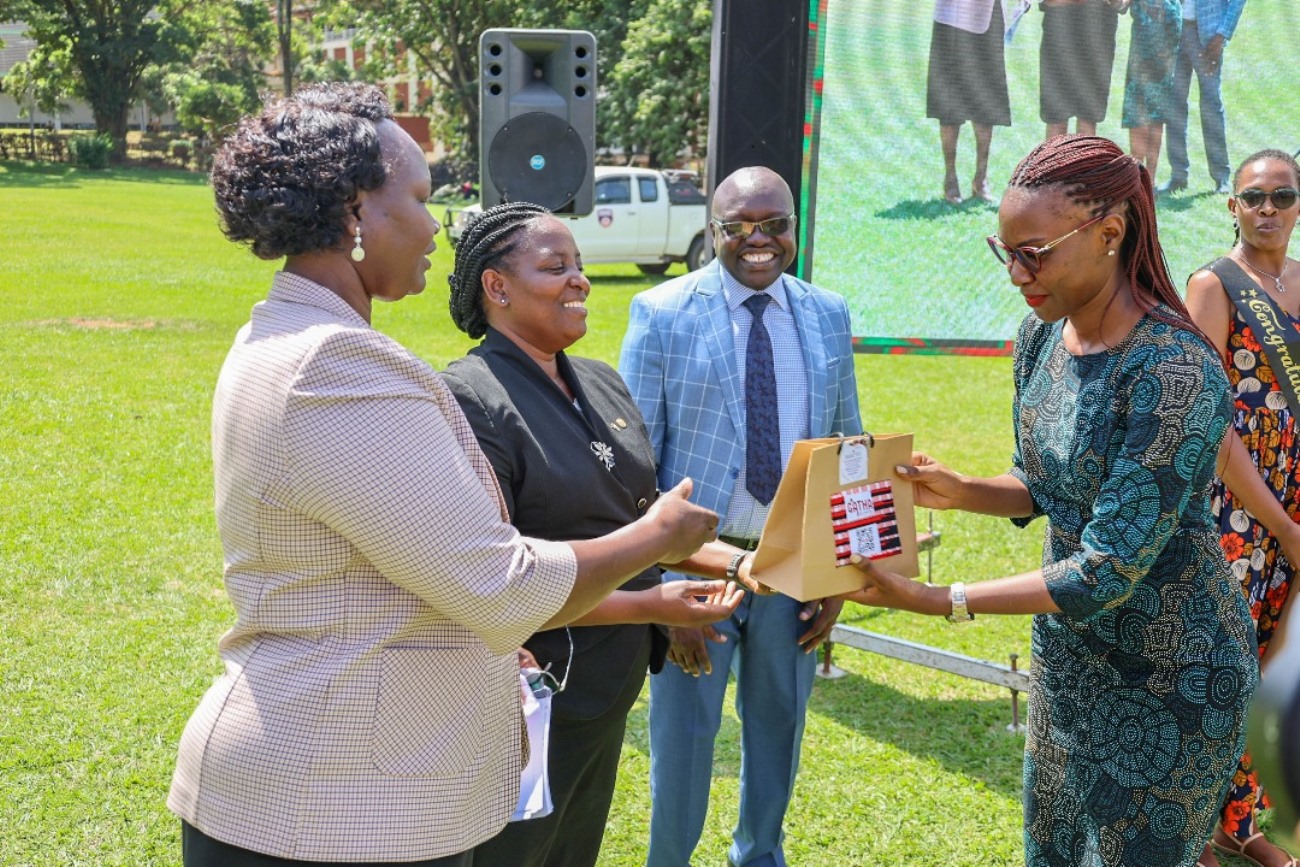
Ms. Naumo highlighted the government’s commitment—both technical and financial—to support outstanding student projects from the course. She stressed the importance of equipping professionals with the skills to bridge gaps between research and practice for consistent, high-quality parenting support across Uganda. While delivering the Vice chancellors speech by Dr. Helen Nambalirwa, Principal of the CHUSS, Prof. Barnabas Nawangwe commended the graduates as a beacon of hope.
“At a time when parenting faces challenges like digital distractions, changing societal norms, and a rising mental health crisis, Makerere reaffirms its support for interventions that drive the societal transformation we desire,” Nawangwe stated.
Prof. Richard Idro, Deputy Principal of the College of Health Sciences, acknowledged the growing parenting challenges in Uganda and the region, adding that the course was a major step towards standardizing parenting interventions nationwide.

He applauded the Child Health and Development Centre (CHDC) for leading this paramount and critical initiative.
Mr. Hosea Katende, Course Administrator at CHDC, emphasized the importance of integrating systematic methods, ethical principles, robust evidence, and collaboration to create lasting impact in parenting.

Dr. Aggrey Dhabangi, Lecturer at CHDC, representing Dr. Herbert Muyinda, Director of CHDC, acknowledged the contributions of partners such as the ELMA Foundation and Echidna Giving for their financial and capacity-building support. He also appreciated the Ministry of Gender, Labour and Social Development, among other stakeholders, for their technical guidance in the programme’s successful implementation.
Dr. Dhabangi extended gratitude to cultural institutions, especially the Kingdom of Teso, and acknowledged growing collaborations with other cultural institutions such as the Kingdom of Acholi, in the shared mission of building strong families as the foundation of Uganda’s future.

He extended his heartfelt gratitude to cultural institutions, especially the Kingdom of Teso, and others kingdoms such as the Kingdom of Acholi, in building Uganda’s future through creating strong families. Nuruh Mbalyowere, a Rehabilitation and Reintegration Officer with the Uganda Prisons Service, was honored for developing the best parenting intervention titled “Parenting Behind Prison Bars.” She expressed her intention to apply the knowledge gained both at home and in her workplace.
Health
MakSPH, DJC Launch Short Course on Health Communication
Published
2 weeks agoon
June 20, 2025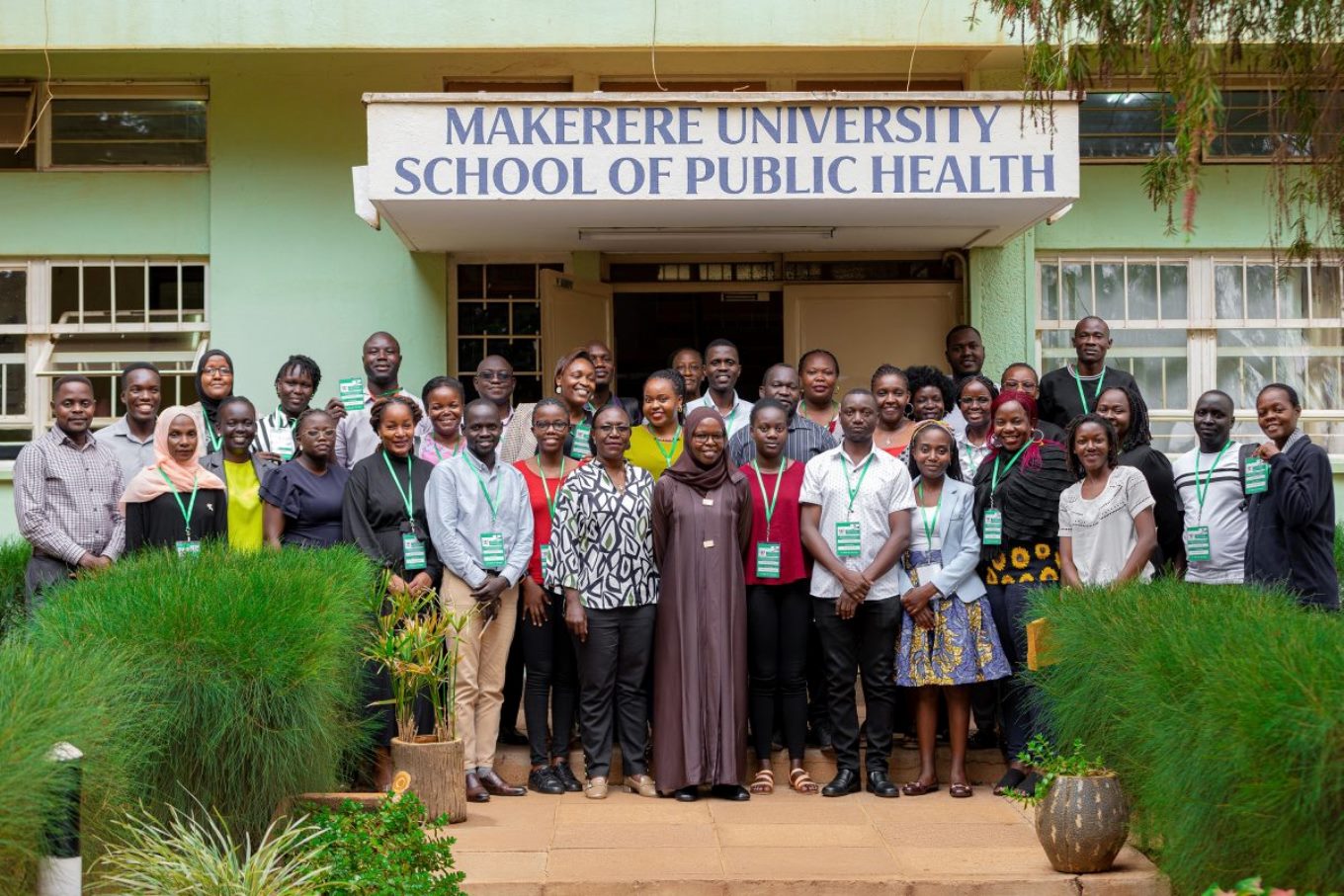
By Okeya John and Primrose Nabankema
The intensive one-month course, running for the first time from June 5 to July 24, 2025, is jointly offered by Makerere University School of Public Health (MakSPH)’s Department of Community Health and Behavioural Sciences (CHBS) and the Department of Journalism and Communication (DJC) at the School of Languages, Literature, and Communication (SLLC), co-designed in 2024 with support from the Rockefeller Foundation through Amref Health Africa.
It seeks to equip healthcare providers at the community level, public health and environmental health practitioners, communication specialists, health educators, community development officers, social scientists, and policy makers, among others, with strategic communication skills to improve public health messaging, strengthen community engagement, and support evidence-based interventions, ultimately empowering participants to effectively engage communities and improve population health outcomes across Uganda and the region.
Launching the course, the heads of the Department of Journalism and Communication and the Department of Community Health and Behavioural Sciences noted that participants who complete the short course will gain practical tools to influence behaviour change, build trust, and deliver timely, accurate, and relevant health information to the communities they serve. The first cohort attracted more than 60 applicants, with 36 reporting for the opening in-person session on June 5, 2025, at MakSPH in Mulago. Between now and July, participants will undergo a hands-on, multidisciplinary learning experience within the Certificate in Health Communication and Community Engagement program, which combines theory and practice.
Among the participants in the first cohort of the certificate course, designed as a pilot for the anticipated Master of Health Promotion and Communication to be jointly offered by the two departments at Makerere University, is Ms. Maureen Kisaakye, a medical laboratory technologist specialising in microbiology and antimicrobial resistance (AMR), and currently pursuing a Master’s in Immunology and Clinical Microbiology at Makerere. She is driven by a passion to help reverse the rising tide of AMR, a growing global health threat where drugs that once worked are no longer effective. Kisaakye is particularly concerned about common infections, like urinary tract infections, becoming increasingly resistant and harder to treat.
“I enrolled in this course because I’m an advocate against antimicrobial resistance, and it came at a time when I needed to deepen my knowledge on how to implement our projects more effectively and engage with communities. The experience has broadened my understanding of AMR and its impact on society, and strengthened my passion for community-driven health initiatives and advocacy,” Kisaakye said, explaining why she enrolled for the short course.

Kisaakye’s work in antimicrobial resistance extends beyond the lab. Having earned her degree in medical laboratory science from Mbarara University of Science and Technology, she founded Impala Tech Research in 2024 to drive impact and save lives. She has led grassroots AMR campaigns that integrate antimicrobial stewardship with water, sanitation, and hygiene (WASH) education in underserved urban communities, including the informal settlements in Kampala. She also has since designed peer-led initiatives that empower university students as AMR Champions, building a network of informed youth advocates. Kisaakye believes the health communication course will sharpen her ability to design and deliver impactful, community-centred interventions in response to the growing threat of drug resistance.
“The department collaborates with many partners within and beyond the University, including the School of Public Health, where we are working to develop the subfield of health communication and promotion. Our goal is to train specialists in this area and build a community of practice, something we have each been doing in our own spaces. There’s a lot of work ahead, and COVID-19 showed us just how urgently we need a generation trained to do this kind of work, and to do it very well,” said Dr. Aisha Nakiwala, Head of the Department of Journalism and Communication, during the opening of the short course on June 5.

She assured participants they were in good hands and underscored the importance of the partnership between the Department of Journalism and Communication and the School of Public Health, describing it as a vital collaboration that brings together strategic communication and public health expertise. This dynamic, multidisciplinary approach, she noted, is essential to developing practical solutions that empower communities, strengthen health systems, and ultimately improve livelihoods.
The course offers a hands-on, multidisciplinary learning experience, with participants intended to explore key modules including Health Communication and Promotion, Risk Communication, Smart Advocacy, Community Mapping, Community Mobilisation and Empowerment, and Strategies for Community Engagement. The course combines theory with real-world application, and its assessment includes a field-based project and a final exam.
“You are our first cohort. We are seeing the fruits of our efforts in bringing this short course to life. It was born out of a joint initiative to develop a Master’s programme in Health Promotion and Communication,” said Dr. Christine Nalwadda, Head of the Department of Community Health and Behavioural Sciences. “We carried out extensive consultations with our different key stakeholders during the process and discovered a real need for such a course. It was the stakeholders who even named it; this course name didn’t come from us.”
For Kisaakye, by the end of the course in July, she hopes to have sharpened her skills in health promotion and strategic communication, particularly in crafting targeted messages that help individuals and communities effectively respond to threats such as antimicrobial resistance. She also aims to gain practical experience in designing, implementing, and evaluating community health initiatives that can strengthen her advocacy and drive lasting impact.
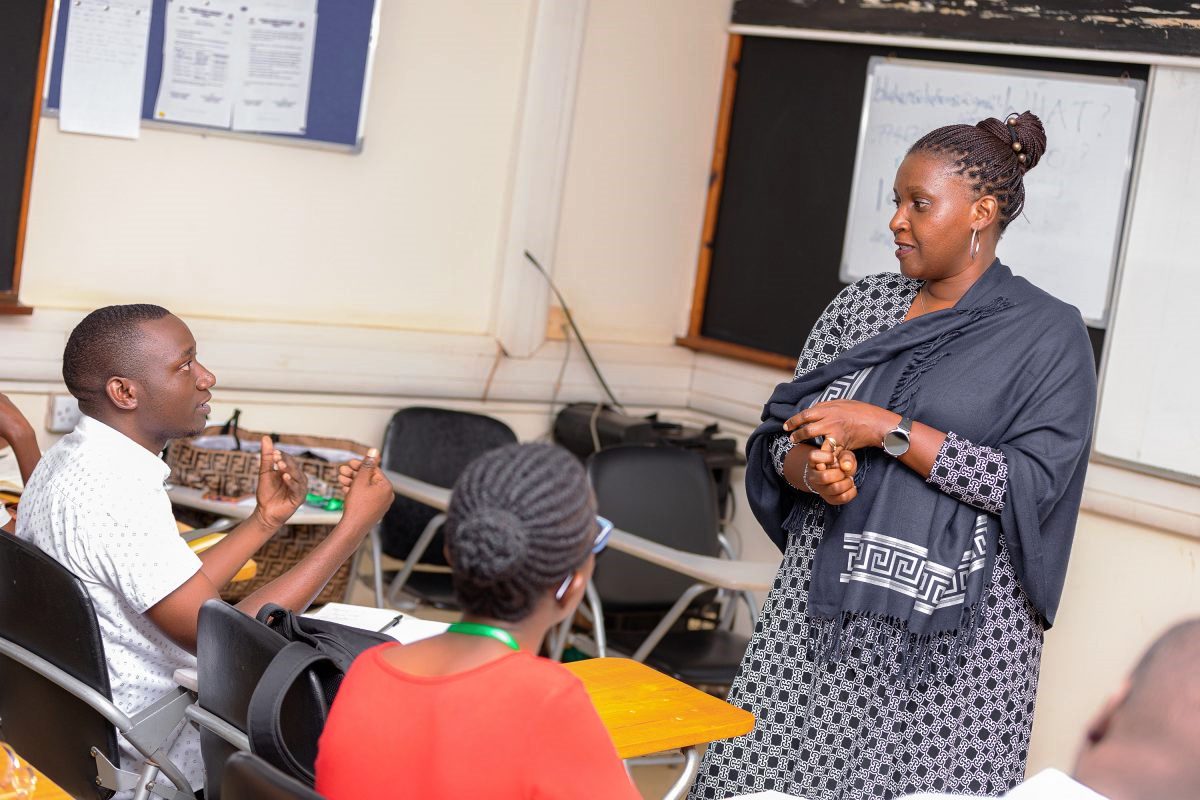
Trending
-

 General6 days ago
General6 days agoMature Age Scheme Exam Results for 2025/2026
-

 General1 week ago
General1 week agoFreshers’ Joining Instructions 2025/2026
-

 General2 days ago
General2 days agoUndergraduate Admission List Self Sponsorship Scheme 2025/2026
-

 General2 weeks ago
General2 weeks agoMastercard Foundation Board pays its inaugural visit to Makerere University
-

 General1 week ago
General1 week agoUVCF Makes Case for HEAC Programme
